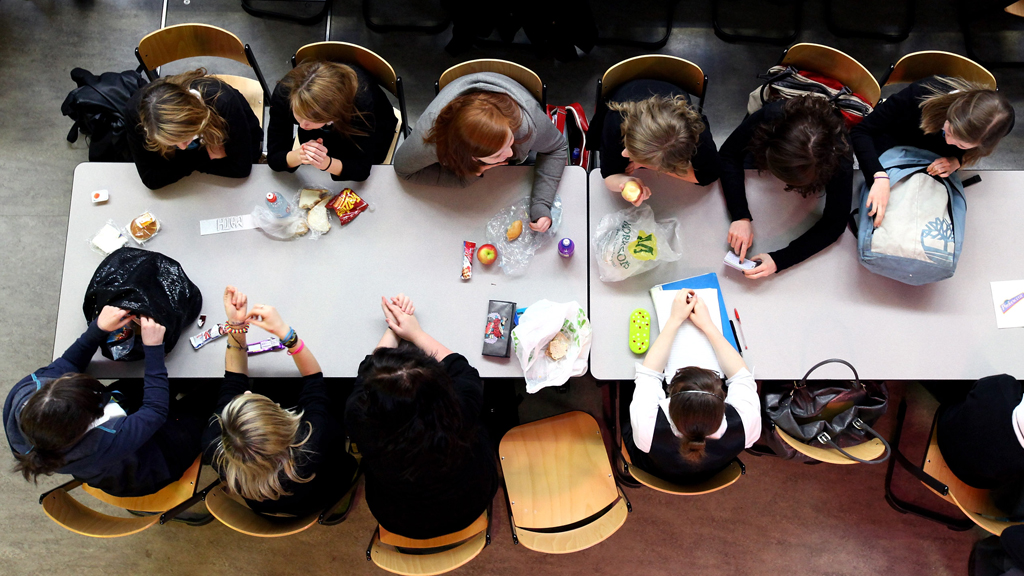Ban packed lunches, headteachers told
School dinners are much better for pupils than packed lunches, which should be banned by headmasters – the message of a new government-commissioned report.

The report by the founders of the Leon chain of restaurants, Henry Dimbleby and John Vincent, says school food has greatly improved since the “dark days of the turkey twizzler” but that only 43 per cent of children eat in canteens.
The report says: “Many parents mistakenly imagine that a packed lunch is the healthiest option. In fact, it is far easier to get the necessary nutrients into a cooked meal – even one of mediocre quality.
Eating school dinners is better for children. It is also better for the school’s finances. A half-empty dining hall – like a half-empty restaurant – is certain to lose money. School food report
“Only 1 per cent of packed lunches meet the nutritional standards that currently apply to school food.
“This country faces a serious health crisis caused by bad diet. Almost 20 per cent of children are already obese by the time they leave primary school at 11. Diet-related illnesses are putting a huge strain on the nation’s coffers – costing the NHS £10bn every year.
“We need to tackle the problem now, before the costs (both personal and financial) become too heavy to bear.
“Eating school dinners is better for children. It is also better for the school’s finances. A half-empty dining hall – like a half-empty restaurant – is certain to lose money.
“In order for the school food service to break even, average take-up needs to get above 50 per cent. In other words, the system is currently bust. It has to be subsidised with money from school budgets and local councils, to the tune of £140m a year.”
‘Losing money’
Under the proposals, headteachers have been encouraged to ban children from bringing in packed lunches and from leaving the school to go for lunch.
It argues that the good food available to school canteens will help improve academic achievement.
“Canteens are a bit like a restaurant – if you’re half empty, you’re losing money” said Mr Dimbleby, speaking to BBC Radio 4. “The more children you have in, the better food you can serve at a cheaper price.
“We did a survey of 400 headteachers. Over 90 per cent believe strongly that food has a direct effect on academic achievement and behaviour.”
Education secretary Michael Gove is understood to be broadly in favour of the plan. The Department of Education said on Thursday that it would provide a £16.1m injection of cash over the next two years, including £11.8m for organisations such as the Children’s Food Trust and the Food For Life Partnership, to help turn around schools that are struggling with their lunch service, and £3.15m to ensure healthy breakfasts are available for thousands of children who arrive at school hungry.
The government has agreed to provide funding for specialist organisations to go into 5,000 schools that are struggling with their lunch service, to help them turn things around.
Boris Johnson has also agreed to create “food boroughs” in London, to help prove that better school food will increase academic attainment.
Free meals?
The report also suggests that all primary school meals could be provided for free.
“We believe that there is enough evidence – both from abroad and from English schools – to justify the partial introduction of universal free school meals,” the report said.
Other recommendations are that teachers should be encouraged to sit in on school meals, that prison-like canteen trays should be scrapped, and after-school cooking lessons should be offered for parents with their children.
Labour’s food standards should apply in all schools, and Michael Gove needs to perform another U-turn to ensure they do. Sharon Hodgson, shadow children’s minister
However, child nutritionist and author Jenny Tschiesche has suggested parents will be against the idea that they will be forced to pay for canteen meals.
“It doesn’t cost more than £2 to put together a healthy packed lunch – in fact, it can cost significantly less. It is very possible for parents to put together a lunchbox that is healthier than a school meal.”
Ms Tschiesche warned that children often do not eat the fruit and vegetables included in school dinners, while parents who prepare lunchboxes know what healthy options their children prefer.
“A parent that puts together a packed lunchbox has a greater degree of control,” she said. “Most parents don’t even know what goes in a school dinner.”
‘Undermined’
Labour criticised the government for “undermining” the work it had done to improve the nutritional value of school meals.
Sharon Hodgson MP, shadow children’s minister, said: “All the evidence shows that a filling and nutritious school lunch can improve attainment and health, and when the country is in the middle of a childhood obesity crisis, it is important that schools are doing their part to improve diets.
“Labour vastly improved the quality of school food after Jamie Oliver’s important campaign. David Cameron and Michael Gove have deliberately undermined that progress by exempting academies and free schools from Labour’s rules, and junk food has crept back into canteens and vending machines.
“Parents deserve to have confidence in the quality of school meals. Labour’s food standards should apply in all schools, and Michael Gove needs to perform another U-turn to ensure they do.”
-
Latest news
-
Post Office Inquiry: Chairman intervenes as public gallery scoffs4m

-
Inside Sudan: An unfolding humanitarian catastrophe7m

-
What are the public spending plans for the election promises?3m

-
Michael Matheson faces Scottish parliament suspension over £11,000 iPad bill2m

-
Dudley voters divided on Rishi Sunak’s record as PM13m

-




